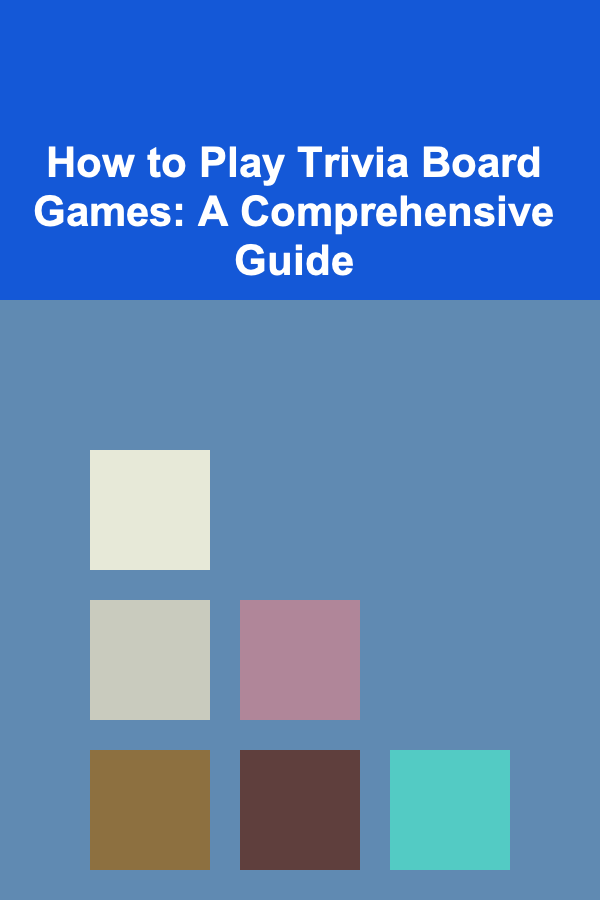
How to Play Trivia Board Games: A Comprehensive Guide
ebook include PDF & Audio bundle (Micro Guide)
$12.99$10.99
Limited Time Offer! Order within the next:

Trivia board games are a classic form of entertainment that challenge players' knowledge across a wide variety of topics. These games, often involving questions and answers, test players' memory, learning, and reasoning abilities in a fun and competitive setting. Whether you are playing with friends or family, trivia board games offer a great way to engage in a social activity that is both entertaining and intellectually stimulating.
In this article, we will explore the key components of trivia board games, provide strategies for playing, and examine some of the most popular trivia games on the market. By the end, you'll have a deeper understanding of trivia games and how to enhance your chances of winning.
What Are Trivia Board Games?
Trivia board games are games where players compete by answering questions related to various subjects. The questions can cover a wide range of topics, such as history, geography, science, pop culture, literature, and more. The objective is usually to correctly answer questions and accumulate points to win the game.
These games typically involve two or more players, and they can be played in individual or team formats. Players take turns answering questions, moving along a game board, or completing other challenges based on the game's rules. The combination of knowledge, strategy, and luck makes trivia board games appealing to a broad audience.
Key Components of a Trivia Board Game
Before diving into the rules and strategies, it is important to understand the basic components of trivia board games. These components can vary from one game to another, but they generally include the following:
1. Game Board
The game board is a central feature of most trivia games. It often consists of spaces or areas players move through as they answer questions or complete challenges. For instance, in games like Trivial Pursuit, players move a piece around the board, landing on different categories of questions.
2. Trivia Cards or Question Deck
The trivia cards or question deck is where the game's questions come from. These cards contain questions that players must answer to advance in the game. They typically include multiple-choice, true or false, or open-ended questions across various categories.
3. Answering Mechanism
In many trivia games, players are required to answer questions within a certain time limit. This could be done by raising a hand, using an electronic buzzer, or simply responding within a given timeframe. The answering mechanism may differ depending on the game but adds an element of excitement and competition.
4. Pieces or Tokens
Players use pieces or tokens to represent their progress on the game board. In some games, these pieces may move based on the answers they provide, while in others, they might represent individual scores.
5. Scorekeeping
Almost all trivia board games include a system for keeping track of each player's score. Players may accumulate points for every correct answer, and sometimes there are penalties for incorrect answers. The scoring system is usually simple, with the player who reaches a certain number of points first being declared the winner.
6. Special Cards or Actions
Many trivia games incorporate special action cards or spaces on the board that provide bonuses or penalties. For example, players might land on a space that allows them to skip a turn, gain extra points, or steal points from another player. These elements add variety and surprise to the gameplay.
Common Rules of Trivia Board Games
While there are many types of trivia games with their own specific rules, most share a common structure. Here's an overview of typical rules you can expect when playing trivia board games:
1. Turn-Based Play
Most trivia games are turn-based, meaning that players take turns answering questions or completing tasks. Players will usually take one turn at a time, answering a question, moving their piece, or taking an action according to the rules of the game.
2. Categories or Themes
Trivia board games often organize questions into categories or themes. For example, Trivial Pursuit features categories such as History, Science & Nature, Entertainment, and Geography. Players typically choose a category when they land on specific spaces or are prompted to answer a question.
3. Correct Answers and Points
In many trivia games, players earn points for correctly answering questions. Points may be awarded in different amounts depending on the difficulty of the question or the category chosen. Some games, like Trivial Pursuit, award a pie-shaped token for answering questions in different categories, and players need to complete their pie to win the game.
4. Time Limits
In some trivia board games, players must answer questions within a time limit. This adds an element of pressure to the game and requires players to think quickly. Time limits are often enforced using a timer, and players who fail to answer within the allocated time might lose their turn or forfeit points.
5. Winning the Game
The ultimate goal of most trivia board games is to be the first player or team to reach a specific objective. For example, in Trivial Pursuit, players must complete their token by correctly answering questions from all the categories and then reach the center of the board to win. The first player to do so is declared the winner.
Popular Trivia Board Games and How to Play Them
1. Trivial Pursuit
Trivial Pursuit is one of the most iconic trivia board games, having been a staple of social gatherings for decades. In this game, players answer questions from different categories to fill their pie-shaped token. Each correct answer allows players to move around the board and earn wedges for their pie. The first player to fill all the wedges in their pie and reach the center space wins the game.
How to play:
- Players move around the board based on dice rolls.
- Each time a player lands on a category space, they draw a card and answer a question from the relevant category.
- Correct answers earn the player a wedge for their pie, which they fill as they continue to answer correctly.
- The player who fills their pie first and answers the final question in the center of the board wins.
2. Wit's End
Wit's End is a trivia game that combines both general knowledge and logic puzzles. Unlike traditional trivia games that focus solely on answering factual questions, Wit's End requires players to solve puzzles that test their problem-solving skills. The goal is to be the first to reach the finish space by correctly answering a series of progressively difficult questions and puzzles.
How to play:
- Players take turns answering questions from four different categories: Brain, Memory, Logic, and General Knowledge.
- Each player can choose a category and must answer a question correctly to move forward.
- The game introduces logical puzzles, and players must use their brains to solve them.
- The first player to reach the final space wins.
3. Smart Ass
Smart Ass is a fast-paced trivia game where players don't have to wait for their turn to answer questions. Players can shout out answers whenever they think they know them, making it a game of speed and knowledge.
How to play:
- Players take turns answering questions in a variety of categories.
- The twist is that players can answer at any time, even if it's not their turn, by shouting "Smart Ass" and giving their answer.
- Correct answers move the player forward on the board.
- The first player to reach the end of the path wins.
4. Brainiac
Brainiac is a trivia game designed for those who love a challenge. It includes multiple types of questions, from general knowledge to specialized categories. Players need to work together as a team to answer difficult questions and avoid penalties.
How to play:
- Players take turns answering questions from different categories.
- The team earns points by answering correctly and must manage their collective score to avoid penalties.
- As the game progresses, players face harder questions and tougher challenges.
- The team with the highest score at the end wins.
Strategies for Winning Trivia Board Games
While trivia board games are often based on knowledge, there are strategies that can improve your chances of winning:
1. Play to Your Strengths
If the game offers categories or topics, focus on your areas of expertise. Whether you're good at history, pop culture, or science, knowing your strengths can help you answer questions more confidently and earn points faster.
2. Pay Attention to Question Types
Some trivia games feature multiple-choice questions, where you can eliminate incorrect answers and increase your chances of getting the correct one. If the game involves true/false questions, focus on patterns and reasoning to improve accuracy.
3. Keep an Eye on Opponents
In multiplayer trivia games, pay attention to how your opponents answer questions. This can give you clues about their areas of knowledge and potentially help you strategize when it's your turn.
4. Manage Time Wisely
If the game uses a timer, try to answer quickly but thoughtfully. Some players panic when under time pressure, so staying calm and focused is key to performing well.
5. Know When to Take Risks
In certain trivia games, you might have the opportunity to wager points or take risks. If you are confident in your answer, this can be a great way to get ahead. However, be cautious of taking too many risks, as losing points can set you back.
Conclusion
Trivia board games are an exciting way to challenge yourself and your friends while having fun. From Trivial Pursuit to Smart Ass, the variety of trivia games available ensures that there's something for everyone, no matter your knowledge or interests. By understanding the basic components, rules, and strategies of trivia games, you can improve your chances of winning and enjoy the game even more.
Remember, whether you're playing casually with friends or competing in a more intense environment, the key to success in trivia board games is a mix of knowledge, strategy, and fun.

Beginner's Guide to Creating a Presentation
Read More
How to Create a Budget to Save for Your Investments
Read More
How to Maintain Your Home's Air Quality Through Proper Ventilation
Read More
How to Organize a Family Trivia Night at Home
Read More
The Advertising Manager's Toolkit: Techniques for Effective Campaign Execution
Read More
How to Master Overlining Your Lips for Volume
Read MoreOther Products

Beginner's Guide to Creating a Presentation
Read More
How to Create a Budget to Save for Your Investments
Read More
How to Maintain Your Home's Air Quality Through Proper Ventilation
Read More
How to Organize a Family Trivia Night at Home
Read More
The Advertising Manager's Toolkit: Techniques for Effective Campaign Execution
Read More